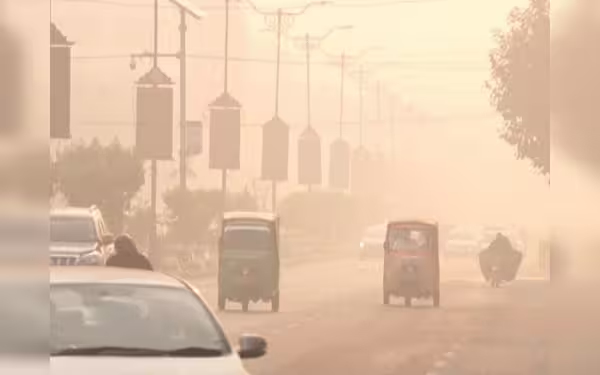Saturday, November 16, 2024 07:51 PM
Punjab Smog Crisis Intensifies as Lahore Tops Pollution Rankings
- Lahore declared 'most polluted city in the world' again.
- Health risks escalate for vulnerable populations amid smog.
- Economic impact includes school closures and overwhelmed healthcare.
 Image Credits: tribune.com.pk
Image Credits: tribune.com.pkPunjab faces a severe smog crisis as Lahore ranks as the 'most polluted city in the world', posing health risks and economic challenges.
The issue of air pollution has become a pressing concern in Pakistan, particularly in the province of Punjab. As the winter season approaches, the phenomenon of smog is once again making headlines. This year, Lahore has been ranked as the "most polluted city in the world" two weeks earlier than it did last year. This alarming trend highlights the severity of the air quality crisis that many residents are facing.
Smog, a mixture of fog and smoke, has enveloped several major cities in Punjab, including the provincial capital, Lahore. The situation is exacerbated by the heavy traffic that plagues the Lahore-Islamabad GT Road, especially during the night. The excessive number of vehicles on the road contributes significantly to the rising levels of air pollution, making it difficult for residents to breathe clean air.
As the smog thickens, it poses serious health risks to the population. People with respiratory issues, children, and the elderly are particularly vulnerable. The government and health officials have repeatedly warned citizens to take precautions, such as wearing masks and limiting outdoor activities during peak smog hours. However, many individuals find it challenging to stay indoors, especially when daily life and work demand their presence outside.
Moreover, the economic impact of prolonged smog spells cannot be overlooked. Schools may close, outdoor businesses suffer, and healthcare systems become overwhelmed with patients suffering from pollution-related illnesses. This creates a ripple effect that can hinder the overall development of the region.
The ongoing smog crisis in Punjab serves as a wake-up call for both the government and the public. It is crucial for authorities to implement effective measures to combat air pollution, such as improving public transportation, regulating industrial emissions, and promoting green spaces. Meanwhile, citizens must remain vigilant and proactive in protecting their health. Only through collective efforts can we hope to clear the air and ensure a healthier future for all.













